113 episodes


COVID-19 interrupted life on multiple levels for many people regardless of race, economic class, or citizenship. For Latina mothers who either lacked legal status or were part of a mixed-status household, the pandemic intensified the challenges they faced even before this health and economic crisis. In their paper, “No Calm Before the Storm: Low-Income Latina Immigrant and Citizen Mothers Before and After COVID-19,” Dr. Marci Ybarra and Francia Mendoza Lua share insights gained through interviews with Latina moms in Chicago before and during the pandemic. Dr. Ybarra is an Associate Professor in the Sandra Rosenbaum School of Social Work at the University of Wisconsin–Madison and is an IRP Affiliate. Her research interests include welfare reform, paid family leave, the children of immigrants, and the socioeconomic well-being of low-income families.
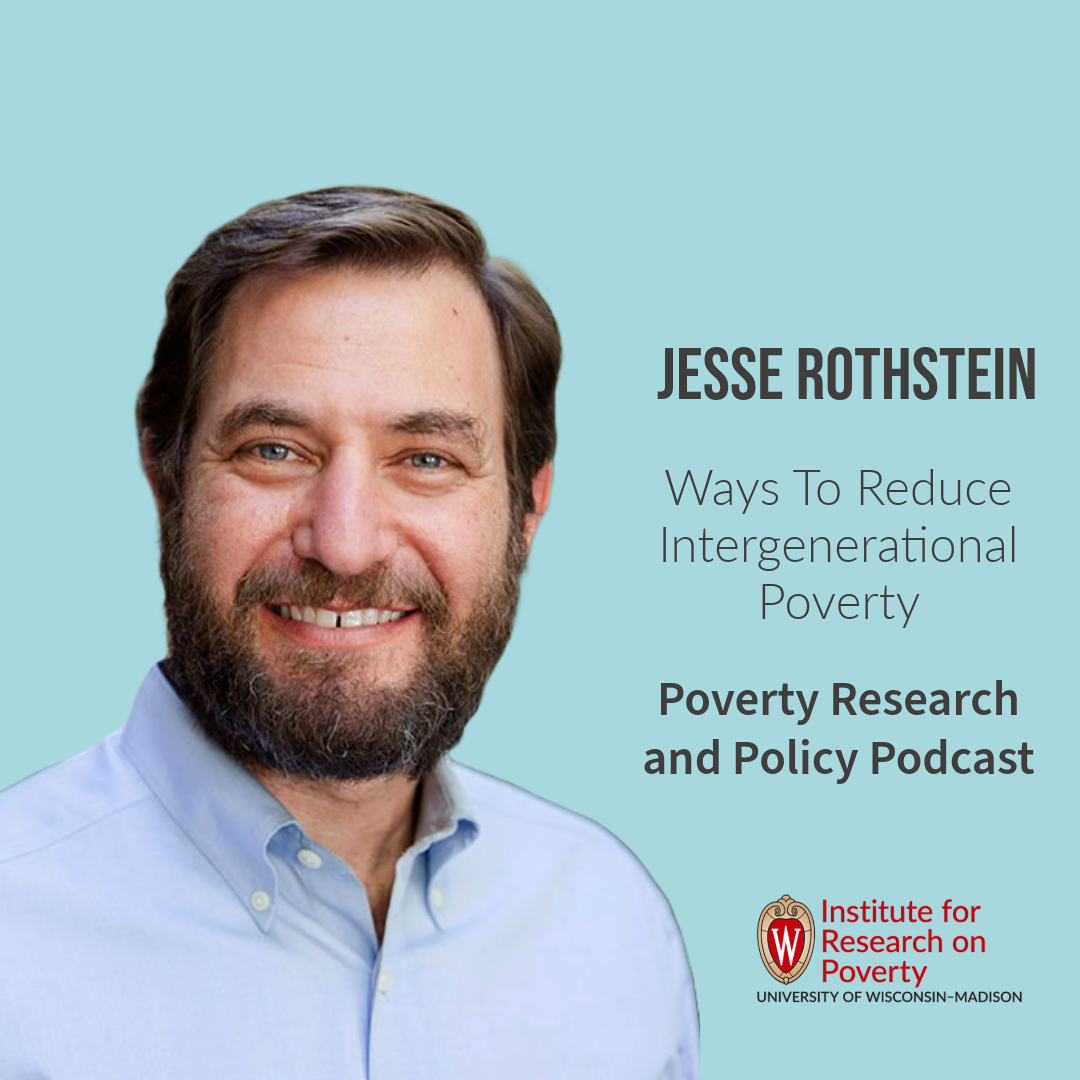

Experiencing poverty in childhood can hinder a person’s opportunities throughout their own lifetime, and those of their children and grandchildren as well. The National Academies of Sciences, Engineering, and Medicine recently released a report titled “Reducing Intergenerational Poverty.” For this episode, we're joined by Jesse Rothstein, who served as a member of the committee that produced the report. He shares the research and findings on several of the key drivers of intergenerational poverty that the committee identified and examined, as well as what policy approaches may help to interrupt the cycle and why that matters. Dr. Jesse Rothstein is a Professor of Public Policy and Economics at the University of California, Berkeley. Previously, he was Senior Economist at the U.S. Council of Economic Advisers and then Chief Economist at the U.S. Department of Labor.
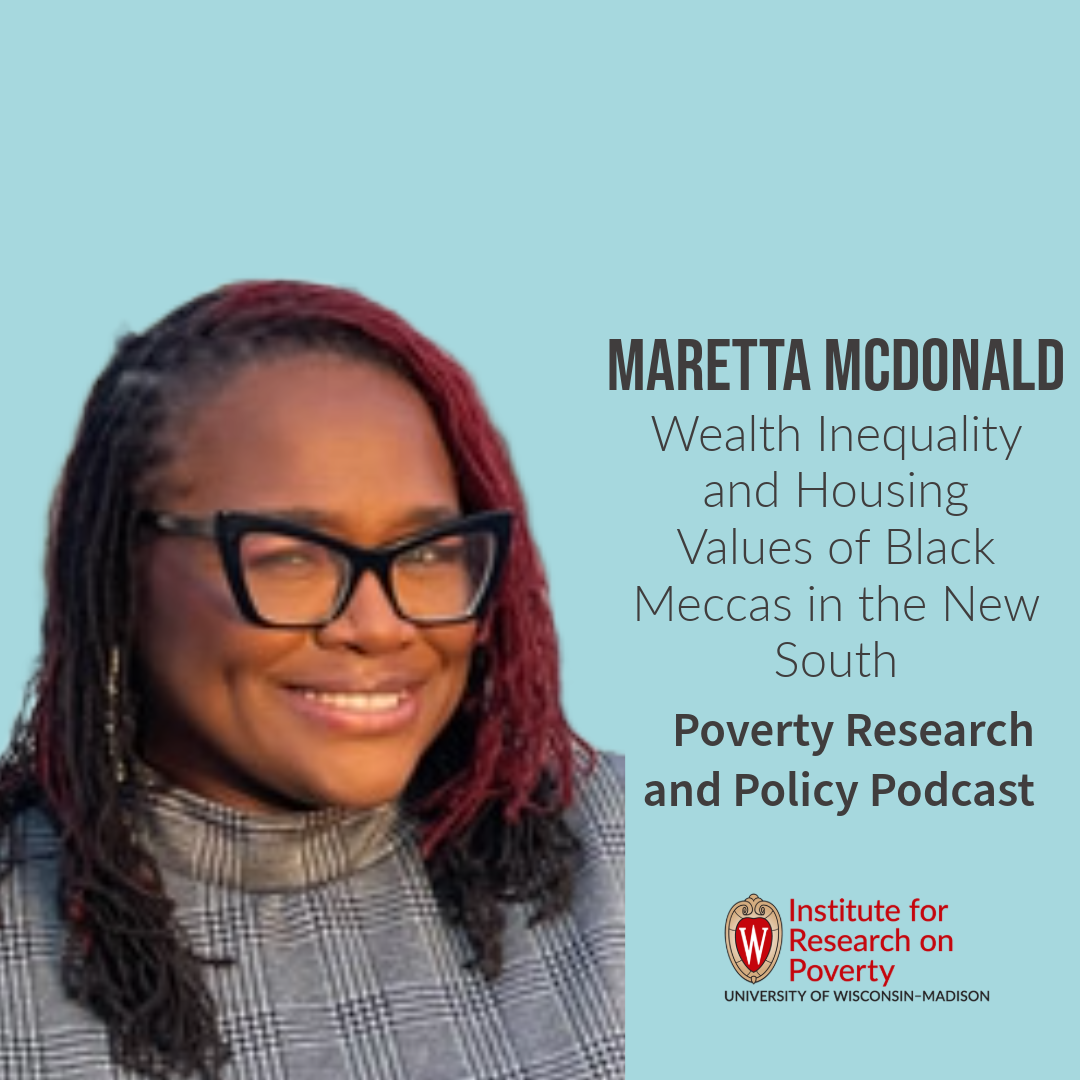

Black Meccas are cities where it appears that Black people are thriving more compared to other places in the US. However, the housing values of Black residents living in these areas are substantially lower compared to their white counterparts, which reveals the presence of wealth inequality even in cities where Black people are supposed to experience a better economic well-being. In this episode Dr. Maretta McDonald discusses the recent paper she co-authored titled, “Wealth Matters: Home Ownership, Housing Values, and the Model Minority Myth of Black Meccas in the New South.” Maretta McDonald is a 2022-2024 IRP National Poverty Fellow and an Affiliate Faculty of Sociology at Virginia Tech. Her teaching and research focus on racial inequality, criminology, family, gender, and public policy.
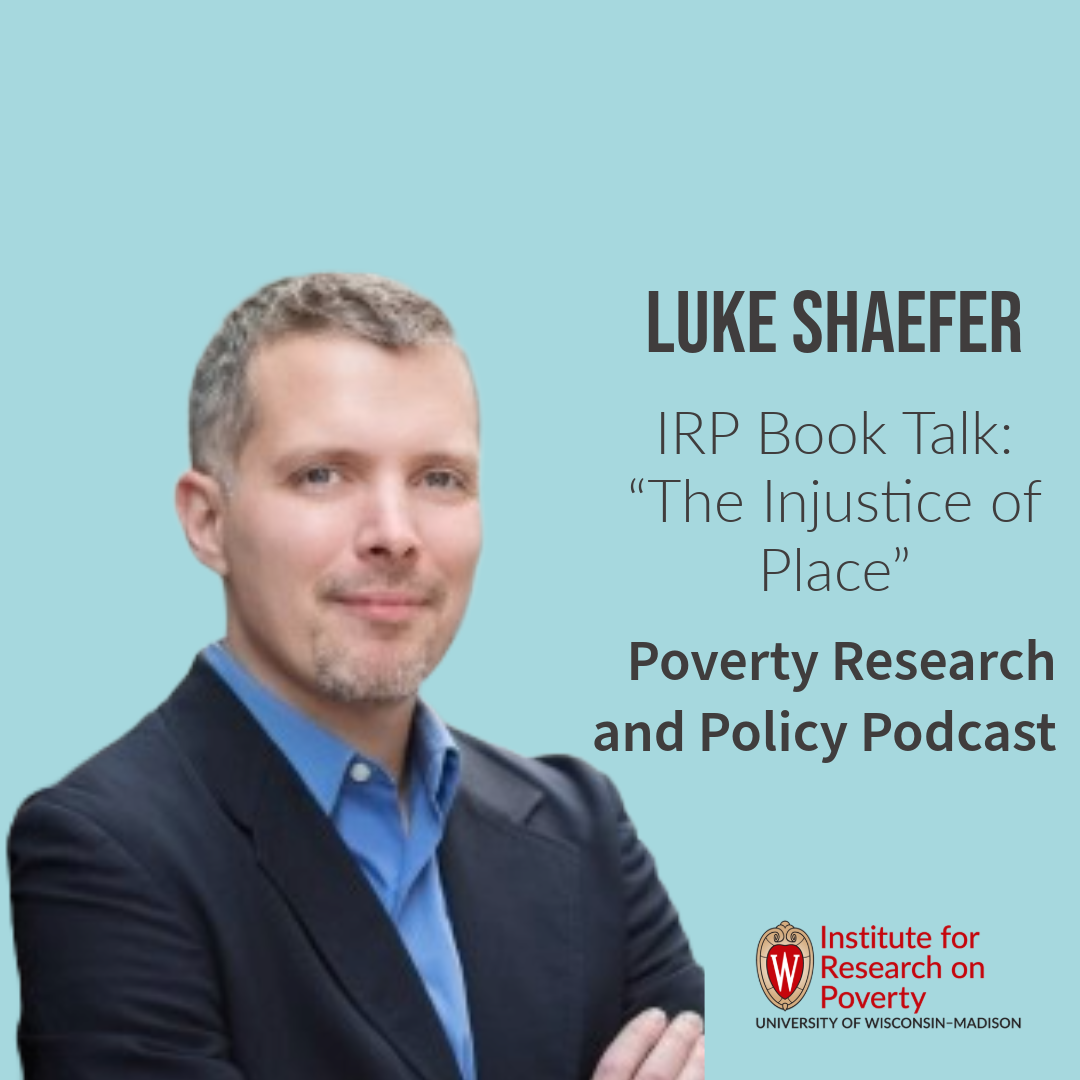

Where you live can affect the quality of education you receive, your chances of finding a good job, and even how long you might live. In their new book, “The Injustice of Place: Uncovering the Legacy of Poverty in America,” Dr. Luke Shaefer and his co-authors Kathryn Edin and Timothy Nelson create a new way of looking at poverty, called the Index of Deep Disadvantage. Their team spends time in and learns about the communities that have the worst scores, and find that legacies of profound racism, extractive big industry, and crumbling social infrastructure contribute to generations of people struggling to thrive. But even in these communities that face multiple layers of challenge and trauma, there are rays of hope and residents determined to improve their lives and those of their neighbors. Luke Shaefer is an IRP Affiliate and the Hermann and Amalie Kohn Professor of Social Justice and Social Policy at the Gerald R. Ford School of Public Policy at the University of Michigan. He is a Professor of Social Work, and the Director of Poverty Solutions https://poverty.umich.edu/, also at the University of Michigan.
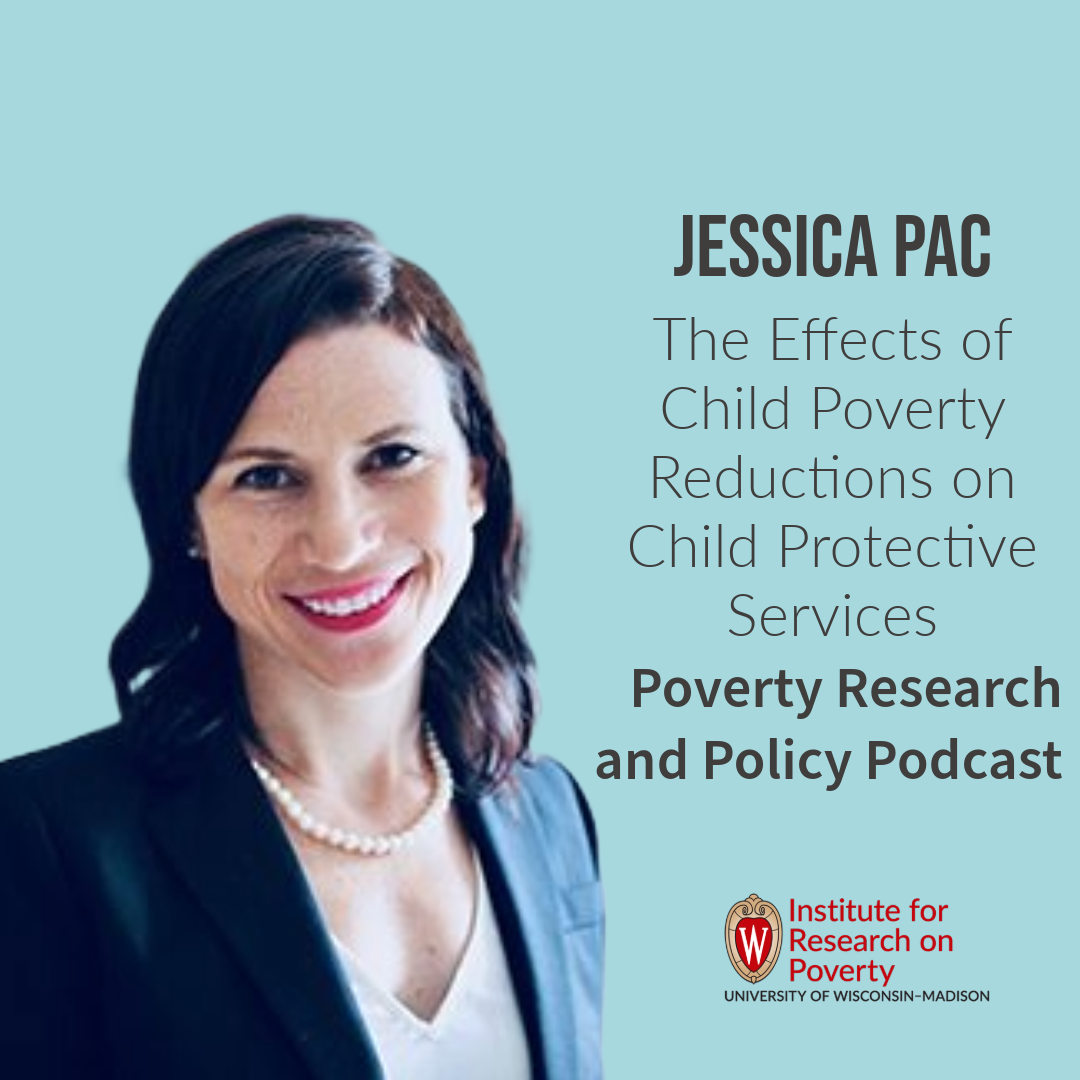

Child Protective Services (CPS) involvement is common, especially for children experiencing poverty, or who are Black or Native American. About a third of children are subject to a CPS investigation before their 18th birthday, but research shows reducing child poverty could help change this. In this episode, Dr. Jessica Pac discusses the recent paper she co-authored titled, “The Effects of Child Poverty Reductions on Child Protective Services Involvement.” Jessica Pac is an Assistant Professor of Social Work at the University of Wisconsin-Madison. Professor Pac’s research broadly harnesses applied econometric and data science methods to provide novel insight on mandatory reporting behaviors and the effects of antipoverty and work-family policy supports on maternal employment, safety and health, and infant and child safety and health.


Reparations for Black Americans is not a new idea—before the U.S. Civil War had ended, there was a proposal to provide freed Black people with “40 acres and a mule.” That did not materialize, and in the ensuing century and a half, the Black descendants of formerly enslaved people have faced systemic injustices, discrimination, and violence. In this episode, Professor William “Sandy” Darity, Jr. and Kirsten Mullen explain what a meaningful reparations program for Black Americans would entail, how eligibility should be determined, and why the federal government is both the “culpable and capable party.” Sandy Darity is the Samuel Dubois Cook Distinguished Professor of Public Policy, African and African-American Studies, and Economics at Duke University. He is also an IRP Affiliate. Professor Darity's research focuses broadly on stratification; economics on inequality by race, class, and ethnicity; and the economics of reparations. Kirsten Mullen is a writer, folklorist, museum consultant, and lecturer whose work focuses on race, art, history, and politics. Together they are the authors of "From Here to Equality: Reparations for Black Americans in the 21st Century," and are also two of the editors of "The Black Reparations Project, A Handbook for Racial Justice."


Many people suffer from not getting enough sleep from time to time. But for many people of color and those who are living in low-income neighborhoods and housing, additional factors may contribute to chronic poor sleep quality. Those factors can have long-term impacts on their health and well-being, including higher rates of heart disease, diabetes, high blood pressure, stroke, obesity, and depression. In this episode, Dr. Dayna Johnson shares her research into how experiences of racism, variable work schedules, and neighborhood conditions contribute to sleep and health inequities for African Americans. Dr. Johnson is a sleep epidemiologist and Assistant Professor in the Department of Epidemiology at the Rollins School of Public Health of Emory University. Her research is aimed at understanding the causes and health consequences of sleep health disparities.
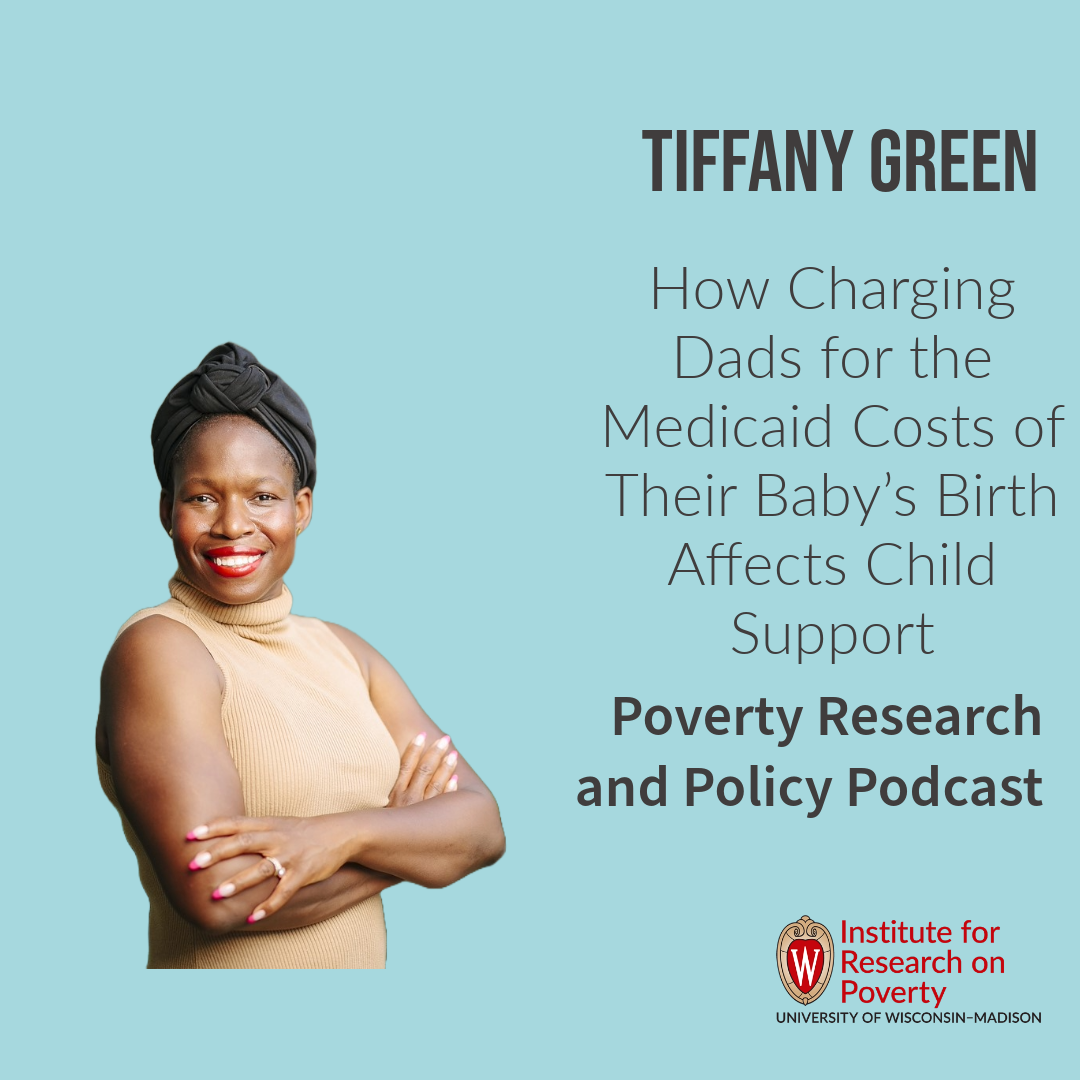

* Wisconsin is one of a few states with a Birth Cost Recovery program, which bills unmarried, non-custodial fathers for the birth costs of their child when the mother is on Medicaid. But the impacts of these policies on the children and both parents have not been studied closely. * In this episode, Dr. Tiffany Green https://pophealth.wisc.edu/staff/green-tiffany/ discusses the report that she co-authored titled, “Effects Of Medicaid Birth Cost Recovery Policy Changes On Child Support Outcomes,” which draws on IRP’s Wisconsin Administrative Data Core (WADC). Tiffany Green is an associate professor in the Departments of Population Health Sciences and Obstetrics and Gynecology within the School of Medicine and Public Health at the University of Wisconsin–Madison and is an IRP Affiliate.
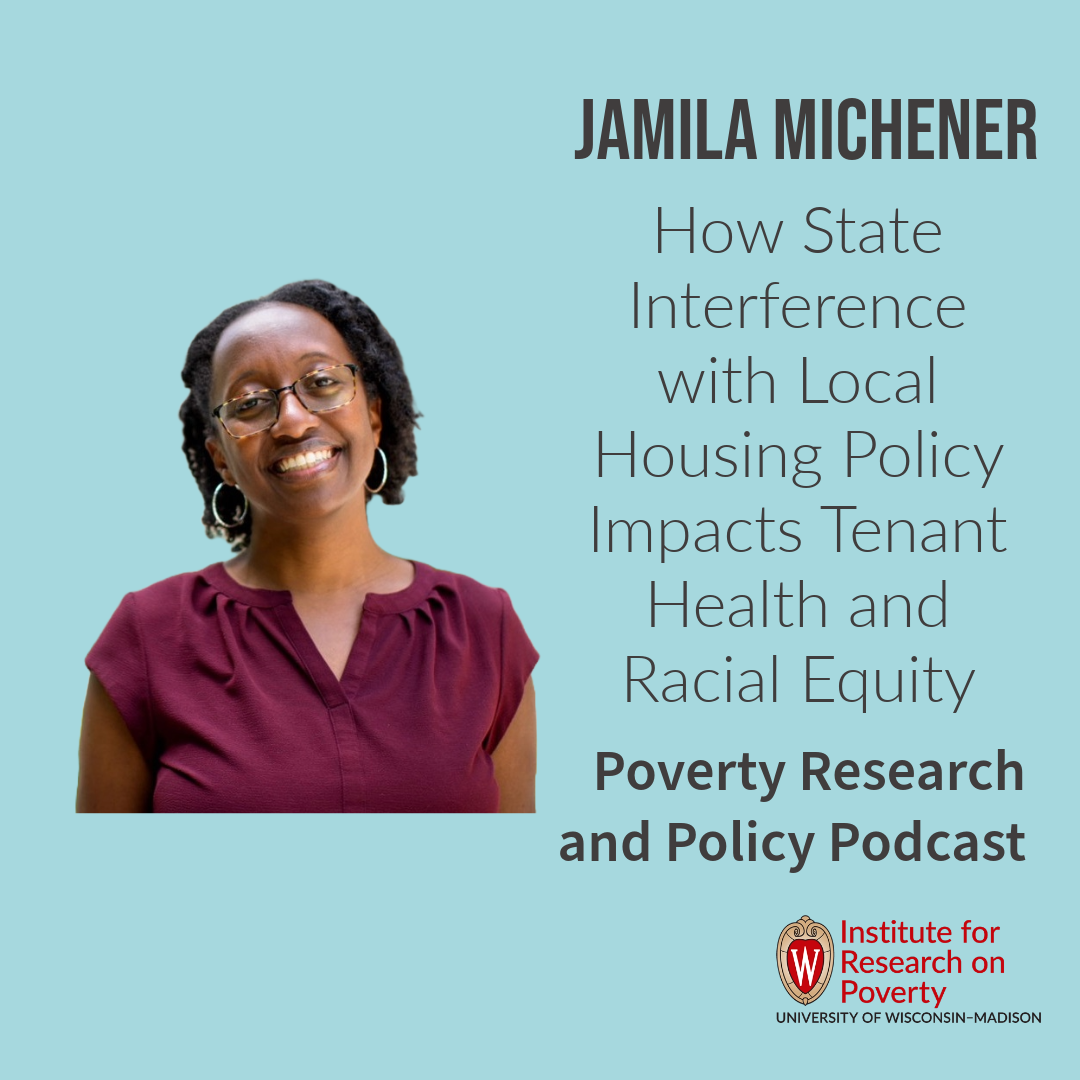

Whether renters have access to safe, high-quality housing has serious implications for health and health equity. Local housing policy often focuses on community residents’ particular needs, yet state law can preempt local ordinances, frequently with detrimental results. In this episode, Dr. Jamila Michener discusses two of her recent papers, “Entrenching Inequity, Eroding Democracy: State Preemption of Local Housing Policy” and "Racism, Power, And Health Equity: The Case of Tenant Organizing.” Jamila Michener is an Associate Professor of Government and Public Policy at Cornell University. She studies poverty, racism, and public policy, with a particular focus on health and housing. She is Associate Dean for Public Engagement at the Brooks School of Public Policy. Dr. Michener has also been named the inaugural director of Cornell’s Racial Justice and Equitable Futures Center. She is a former IRP Emerging Poverty Scholar Fellow and a current IRP Affiliate.
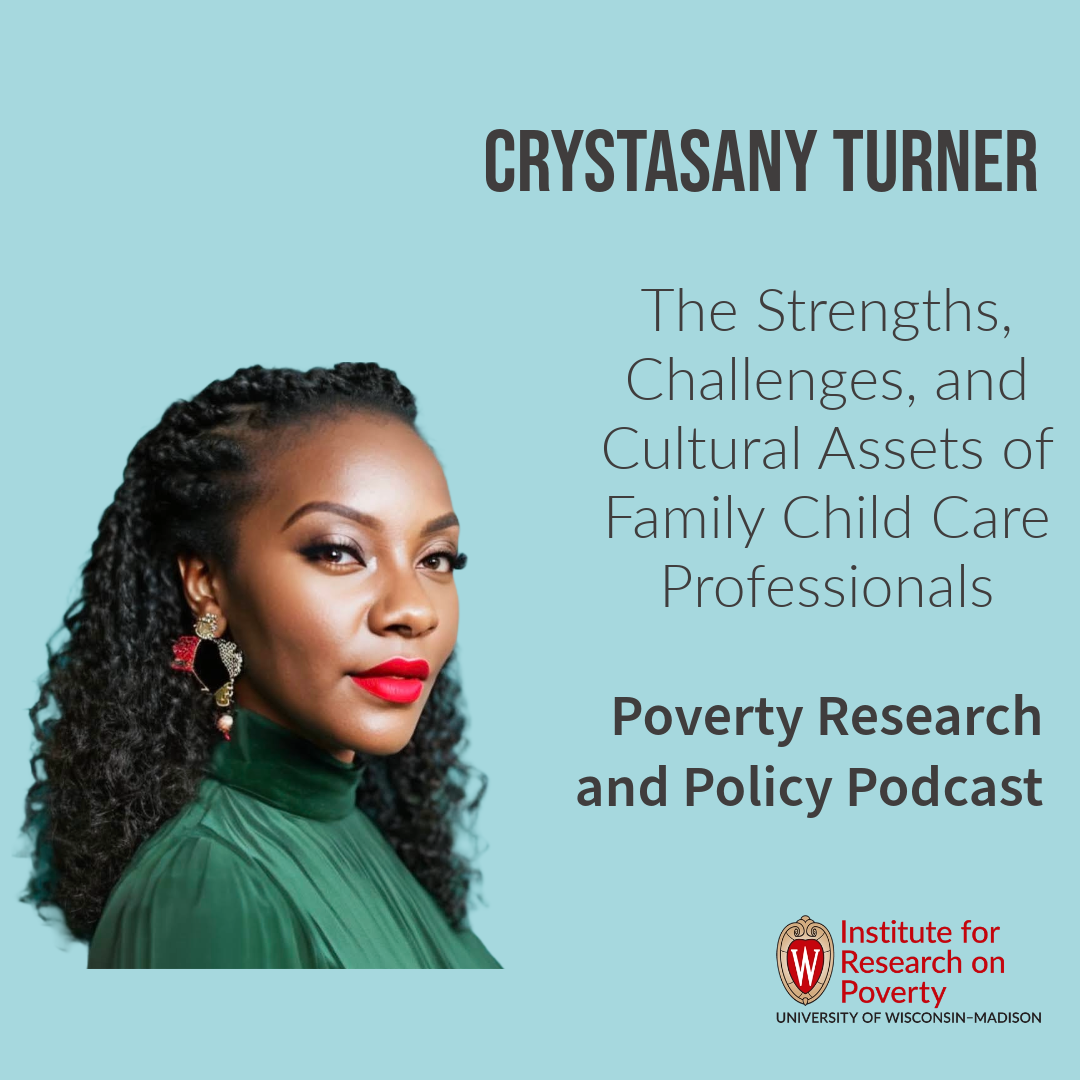

Family child care is the care of non-relative children within the providers' home. Thirty percent of family child care professionals are women of color, and oftentimes the cultural assets they contribute to the field of early care and education are diminished or disregarded. In this episode, Dr. Crystasany Turner discusses her research https://www.researchgate.net/profile/Crystasany-Turner-2 highlighting both the strengths and challenges faced by family child care professionals, future research, and practices to support family child care professionals. Crystasany Turner is an Assistant Professor of Early Childhood Education in the Department of Teaching and Learning at the University of Wisconsin-Milwaukee. Rooted in Black feminist epistemologies, her teaching and research focus on culturally sustaining and liberatory practices in early childhood education and teacher education.
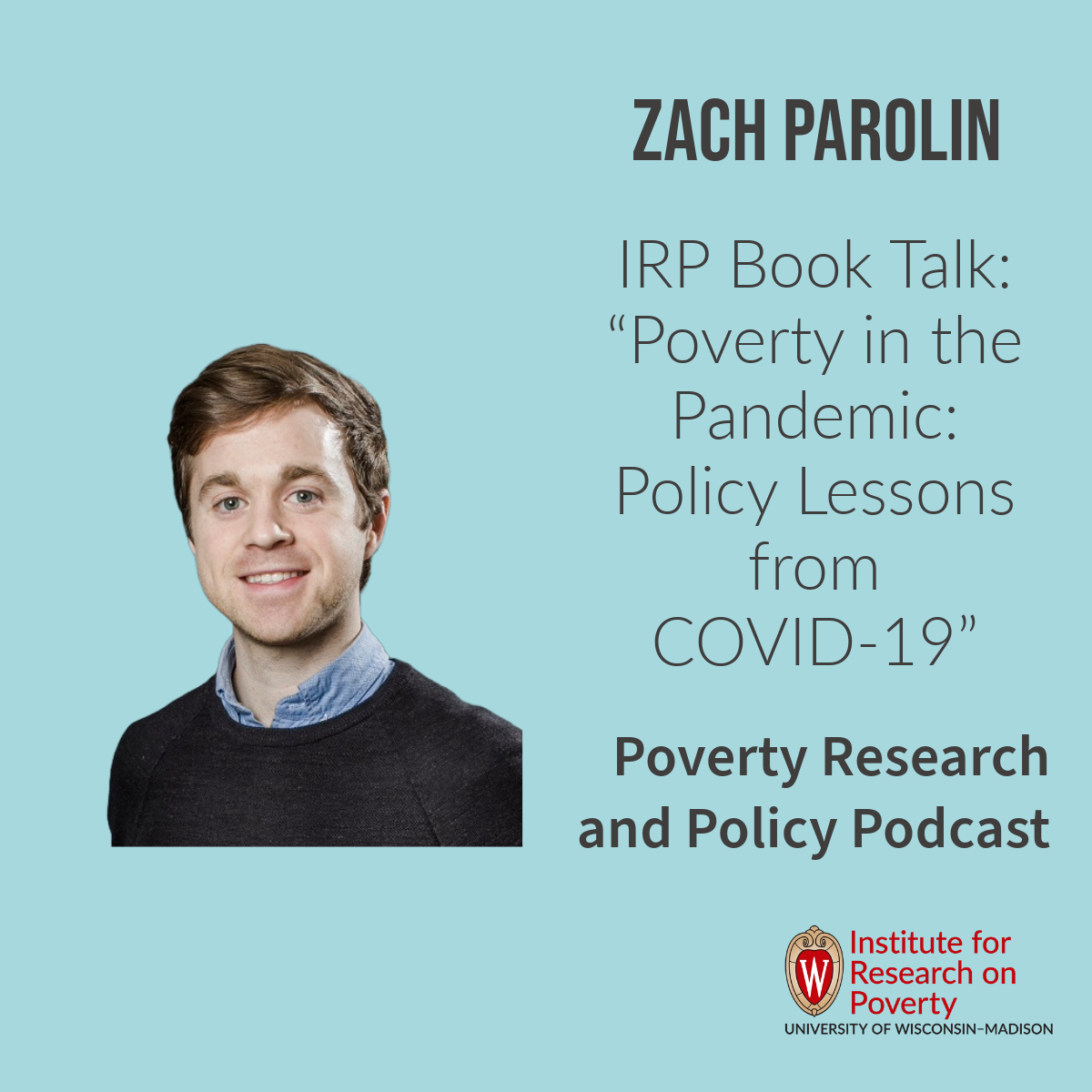

In his new book, Dr. Zachary Parolin explores three perspectives on poverty—poverty as a risk factor, poverty as an expression of access to current resources, and poverty as a stratifying factor—and how they affected people during the COVID-19 pandemic. He advocates for policy approaches that will both prepare us for the next large-scale economic disruption and provide timely assistance when upheaval occurs, and makes the case for more frequent, and more nuanced poverty measures. Zach Parolin is an Assistant Professor of Social Policy at Bocconi University in Milan, Italy, and a Senior Research Fellow at Columbia University’s Center on Poverty and Social Policy. His new book, “Poverty in the Pandemic: Policy Lessons from COVID-19,” was published by the Russell Sage Foundation. https://www.russellsage.org/


* The federal government established a temporary water assistance program to alleviate the burden of water costs on households during the COVID-19 pandemic. Establishing a permanent water assistance program can increase long-term water affordability for households. In this episode, Dr. Manny Teodoro https://lafollette.wisc.edu/people/teodoro-manuel/ discusses the report he co-authored for the National Association of Clean Water Agencies that assessed options for a permanent federal water assistance program and shares how extending SNAP benefits would help increase water affordability. * Manny Teodoro is the Robert and Sylvia Wagner Professor at the La Follette School of Public Affairs at the University of Wisconsin–Madison. His research focuses on U.S. environmental policy and implementation, as well as utility management, policy, and finance.
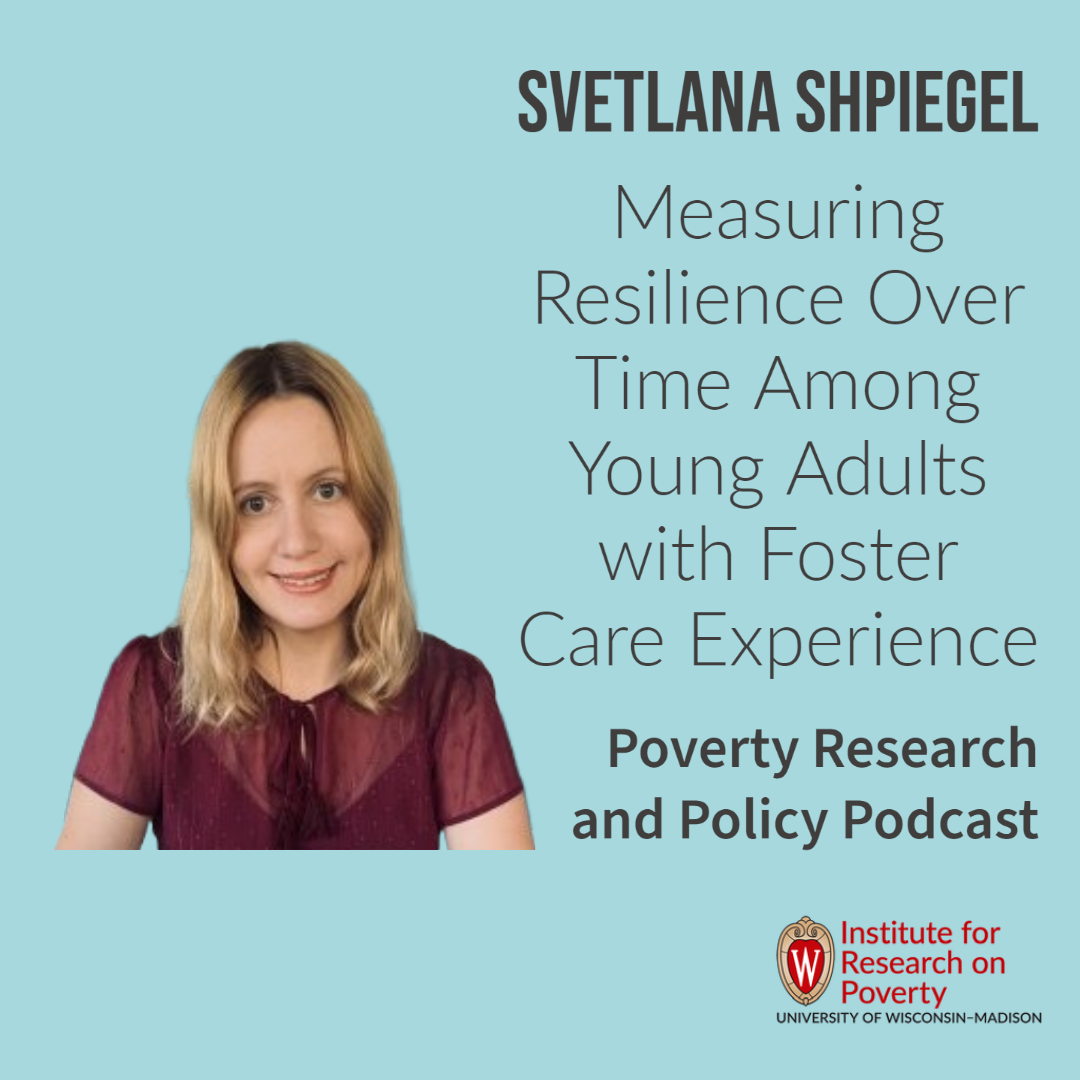

There are known protective factors that can help young people exiting foster care to thrive by reducing or eliminating the challenges that they often face. By measuring resilience over time, and viewing it as “a state, not a trait,” there is more opportunity to create networks and systems to support these young people as they transition to adulthood. In this episode, Dr. Svetlana Shpiegel discusses her co-authored paper, “Resilient Outcomes among Youth Aging-Out of Foster Care: Findings from the National Youth in Transition Database https://www.tandfonline.com/doi/full/10.1080/15548732.2021.1899098,” and shares how she and her colleagues assessed sustained resilience, periodic resilience, and sustained non-resilience among young adults exiting care, and why policies like Extended Foster Care are vital. Svetlana Shpiegel is an Associate Professor at the Department of Social Work and Child Advocacy at Montclair State University. Her research interests include adolescents transitioning from foster care, child abuse and neglect, risk and resilience among vulnerable populations, and early pregnancy and parenthood among child-welfare involved youth.
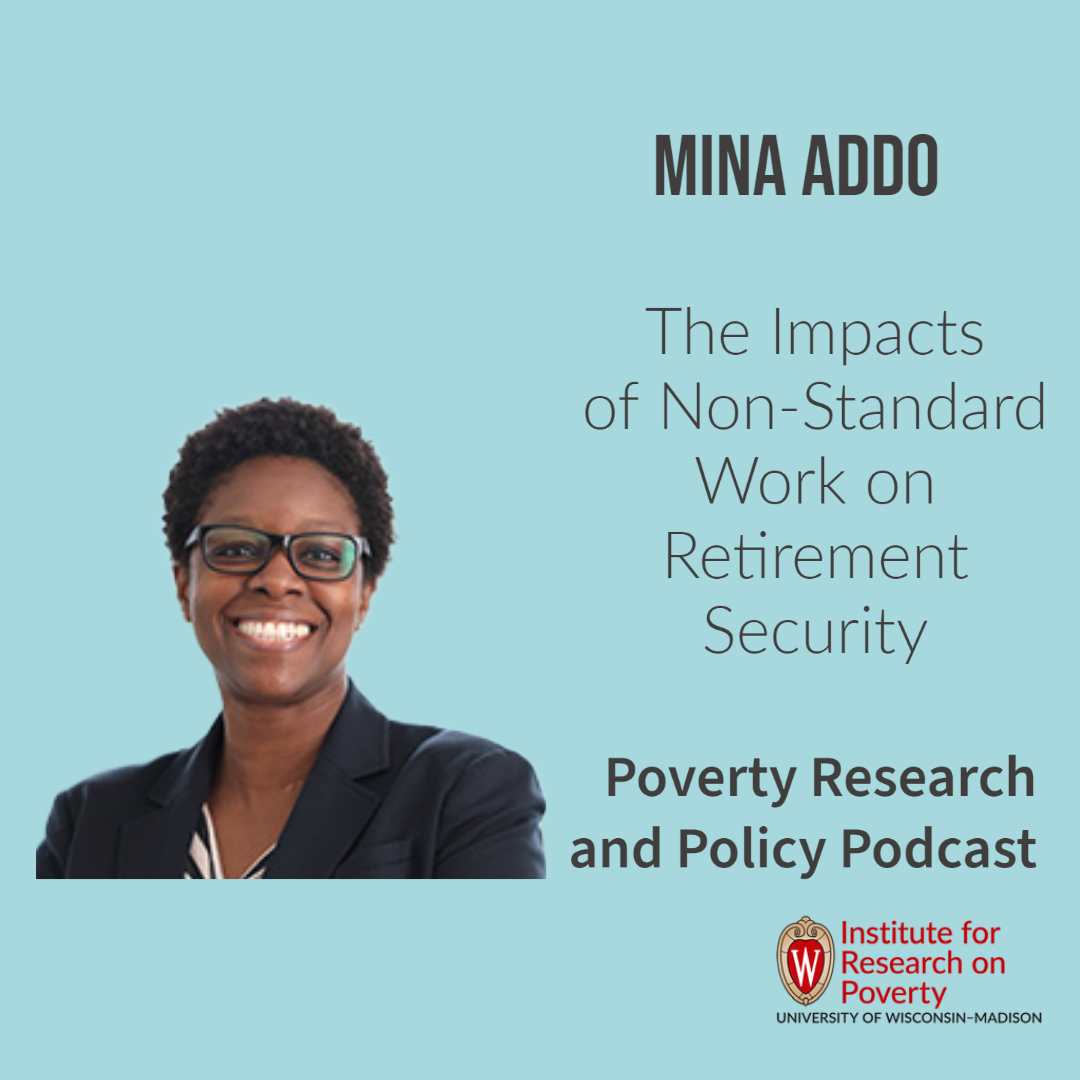

While non-standard work is not a new concept, technology has fueled a recent rise in independent contracting, freelancing, temporary, on-call, and “gig" work. Much of the research on non-standard work has focused on its precarious nature and lower economic security for active workers. In her recent paper, "The Retirement Implications of Non-Standard Work https://cfsrdrc.wisc.edu/project/jsit22-02," Dr. Mina Addo https://www.irp.wisc.edu/staff/addo-mina/ turns her attention to the impacts on retirement security for the large numbers of U.S. workers are participating in non-standard work alone or in addition to traditional employment. Dr. Addo is an IRP National Poverty Fellow in residence at the Office of Planning Research and Evaluation in the U.S. Department of Health and Human Services. She completed her Ph.D. in social welfare at the University of Pennsylvania School of Social Policy and Practice and is a qualitative researcher with experience with mixed methods studies. This paper was funded through a 2022 Junior Scholars and Training Research Award from the Retirement and Disability Research Center https://cfsrdrc.wisc.edu/ of the Center for Financial Security https://cfs.wisc.edu/ at the University of Wisconsin–Madison.


Probation is often considered to be a kinder, gentler alternative to incarceration. But there are significant financial and emotional costs associated with home confinement that affect not just the person who is under supervision, but their families and communities as well. In this episode, we hear from Dr. Brittany Battle. She is an Assistant Professor of Sociology at Wake Forest University and is also the co-founder of Triad Abolition Project, a grassroots organization based in Winston-Salem, NC. Dr. Battle is also an IRP Emerging Poverty Scholar, and her project during that fellowship is to examine the experiences of low-income people and communities in diverse judicial settings and forms of community supervision and confinement.


Self-employment can be a choice, or undertaken by necessity. In the United States, on average, 10 to 12% of the labor force is engaged in some form of self-employment. That proportion can be higher in times of economic downturns, such as during the COVID-19 pandemic. But low- and middle-income workers face many obstacles to being successful in their entrepreneurial activities. In this episode, Dr. Daniel Auguste joins us to discuss the paper that he co-authored with Stephen Roll and Mathieu Despard, titled “The Precarity of Self-Employment among Low- and Moderate-Income Households.” Dr. Auguste explains how self-employment can bring rewards, but also entails assuming significant risks. And for low- and middle-income entrepreneurs, professional networks and access to financing and other necessary supportive services may be difficult to attain. Dr. Daniel Auguste is an Assistant Professor of Sociology at Florida Atlantic University and is currently an MLK Visiting Assistant Professor in the MIT Sloan School of Management. He is also currently an IRP Emerging Poverty Scholar. His research interests include inequality, stratification, economic and organizational sociology, and entrepreneurship. More specifically, his research agenda seeks to understand the structural forces determining who gets what, who participates and to what level they participate in the capitalist production process.


Estimates are that 20–50% of people eligible for social safety net programs don’t access them. While there may be many factors contributing to that gap, recent research has focused on the role that stigma plays. In this episode, Dr. Elizabeth Linos joins us to discuss the paper she co-authored with Jessica Lasky-Fink, titled “It's Not Your Fault: Reducing Stigma Increases Take Up of Government Programs.” Stigma can be direct or anticipated from the wider society, including from agency workers with whom people would need to interact in order to access services. Stigmatizing messages can be internalized as shame or guilt for simply needing services. Through research with municipalities doing outreach for housing assistance during the COVID-19 pandemic, Dr. Linos and her colleagues found that small changes can significantly increase uptake of services simply by destigmatizing the language. Dr. Elizabeth Linos is the Emma Bloomberg Associate Professor for Public Policy and Management, and Faculty Director of The People Lab http://www.peoplelab.hks.harvard.edu/ at the Harvard Kennedy School of Government. The majority of her research focuses on how to improve government by focusing on its people and the services they deliver. Specifically, she uses insights from behavioral science and evidence from public management to consider how to recruit, retain, and support the government workforce, how to reduce administrative burdens that low-income households face when they interact with their government, and how to better integrate evidence-based policymaking into government.


Official measures of homelessness seem to indicate that the Latinx community is less affected than most other minoritized racial groups. But this aspect of what is called “The Latinx Paradox” might in fact be due to the extent of homelessness in Latinx communities being obscured by other factors. In this episode, Dr. Deyanira Nevarez Martinez shares her research into the nuances of Latinx housing precarity, and why understanding the Latinx experience of homelessness is vital for effective public policy and human services provision. Dr. Nevarez Martinez is an Assistant Professor of Urban and Regional Planning at Michigan State University and a core faculty member in Chicano Latino studies. She is also an IRP Emerging Poverty Scholar. Professor Nevarez Martinez's December 2022 IRP SEMINAR PRESENTATION https://www.youtube.com/watch?v=Vk4Wl78Xf_4.
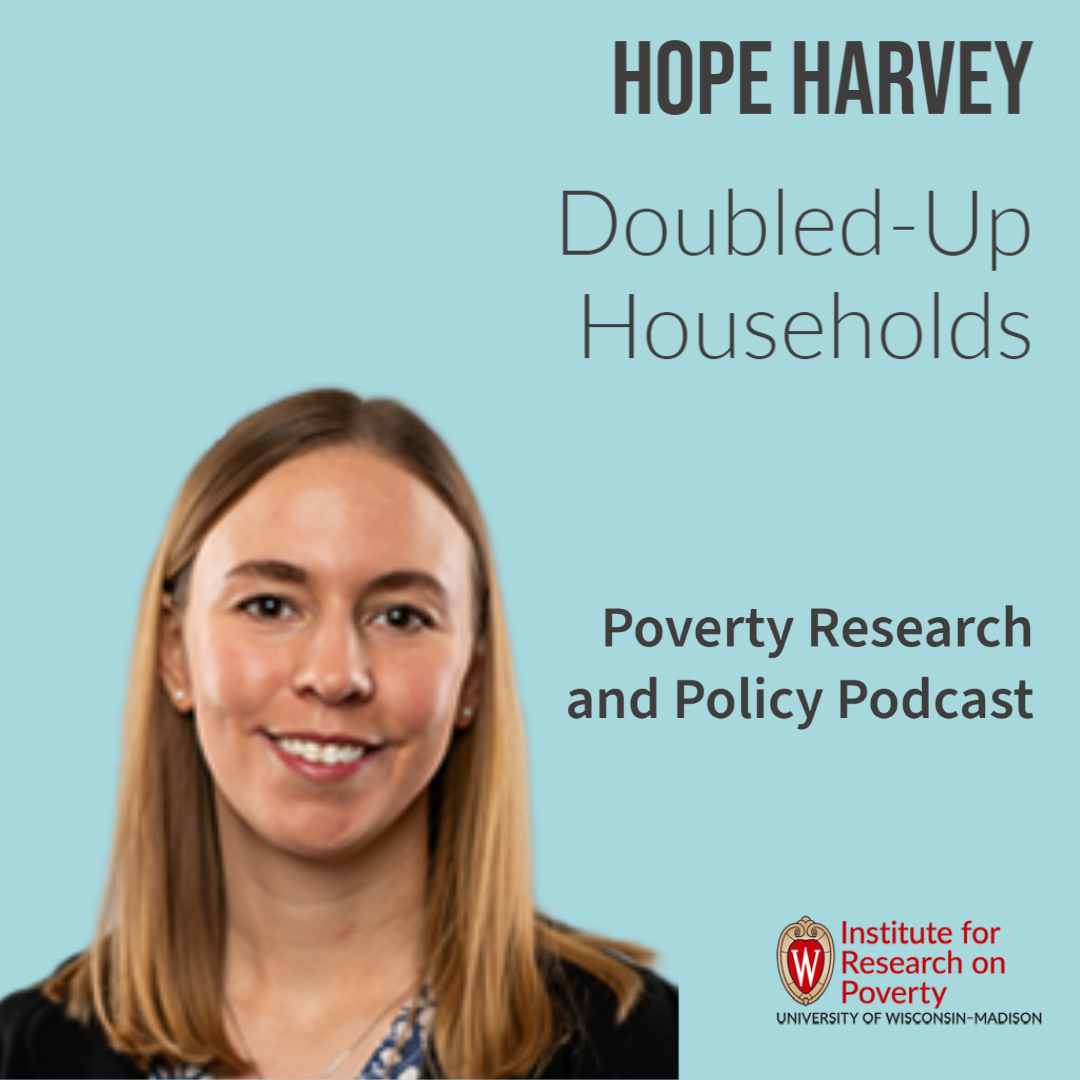

In this episode, we hear from Hope Harvey about doubled-up households in the United States and why she thinks we should be paying more attention to the situations of people who are living in shared households. Professor Harvey is an Assistant Professor of Public Policy at the University of Kentucky, where she is a research affiliate at the University of Kentucky Center for Poverty Research. She's also a 2022-2023 IRP Visiting Poverty Scholar. In the episode, Professor Harvey discusses two papers: Hope Harvey, Rachel Dunifon, and Natasha Pilkauskas. UNDER WHOSE ROOF? UNDERSTANDING THE LIVING ARRANGEMENTS OF CHILDREN IN DOUBLED-UP HOUSEHOLDS. Demography. 2021; 58(3): 821-846. Hope Harvey. WHEN MOTHERS CAN’T "PAY THE COST TO BE THE BOSS": ROLES AND IDENTITY WITHIN DOUBLED-UP HOUSEHOLDS. Social Problems. 2020


High levels of segregation can have significant impacts on communities and the individuals living in them. New research uses railroad tracks as a measure of segregation and overlays data on homicide deaths to determine if people of color living in highly segregated communities are more at risk. In this episode, Dr. Jamein Cunningham shares the findings in the paper he co-authored with Robynn Cox, Alberto Ortega and Kenneth D. Whaley titled "Black Lives: The High Cost of Segregation." Cunningham is an assistant professor in the Jeb E. Brooks School of Public Policy at Cornell University and an IRP Emerging Poverty Scholar Fellow.


In this episode, we hear from Nidia Bañuelos about how we can better value and measure the assets that college students from low income and traditionally underserved backgrounds bring to their education and to their later careers. Bañuelos is an assistant professor in the Division of Continuing Studies at the University of Wisconsin-Madison and an IRP Affiliate. You can find recent work from Bañuelos and colleagues on using Community Cultural Wealth (CCW) frameworks to measure assets and social networks of college students though the Networks and Cultural Assets Project (NACA).
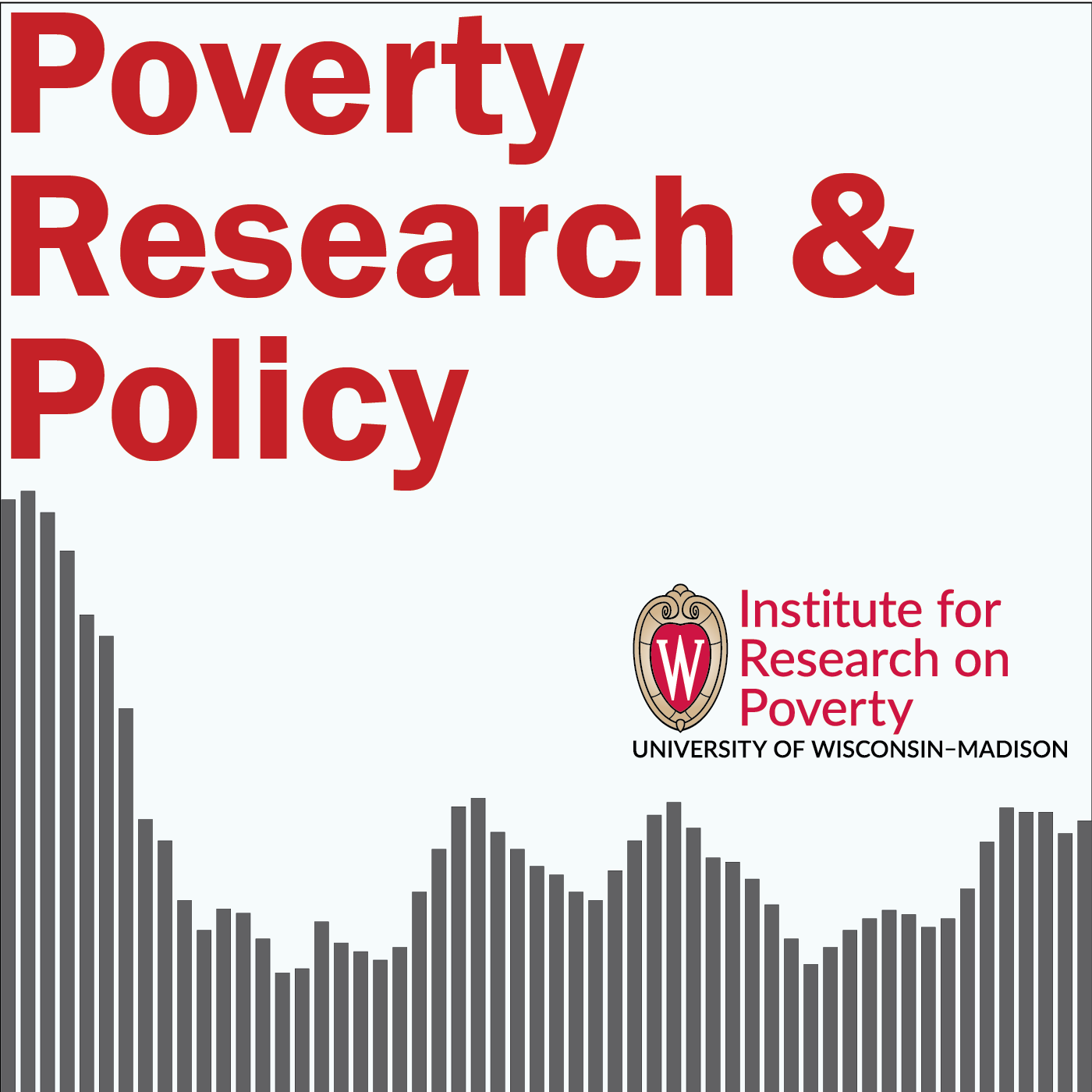

Labor unions receive relatively little attention in U.S. poverty research and our guest for this episode, Professor David Brady, says that this is an unfortunate omission. His research in a paper with Tom VanHeuvelen finds that being in a household with a union member and even being in a state with higher rates of union membership are both correlated with a lower likelihood of being in poverty. Brady says we should pay attention to the role of unions because "political power drives the policies you get, and the policies you get drive the amount of poverty you have in society.” David Brady https://profiles.ucr.edu/app/home/profile/dbrady is Professor of Public Policy at the University of California, Riverside and is an IRP Affiliate.
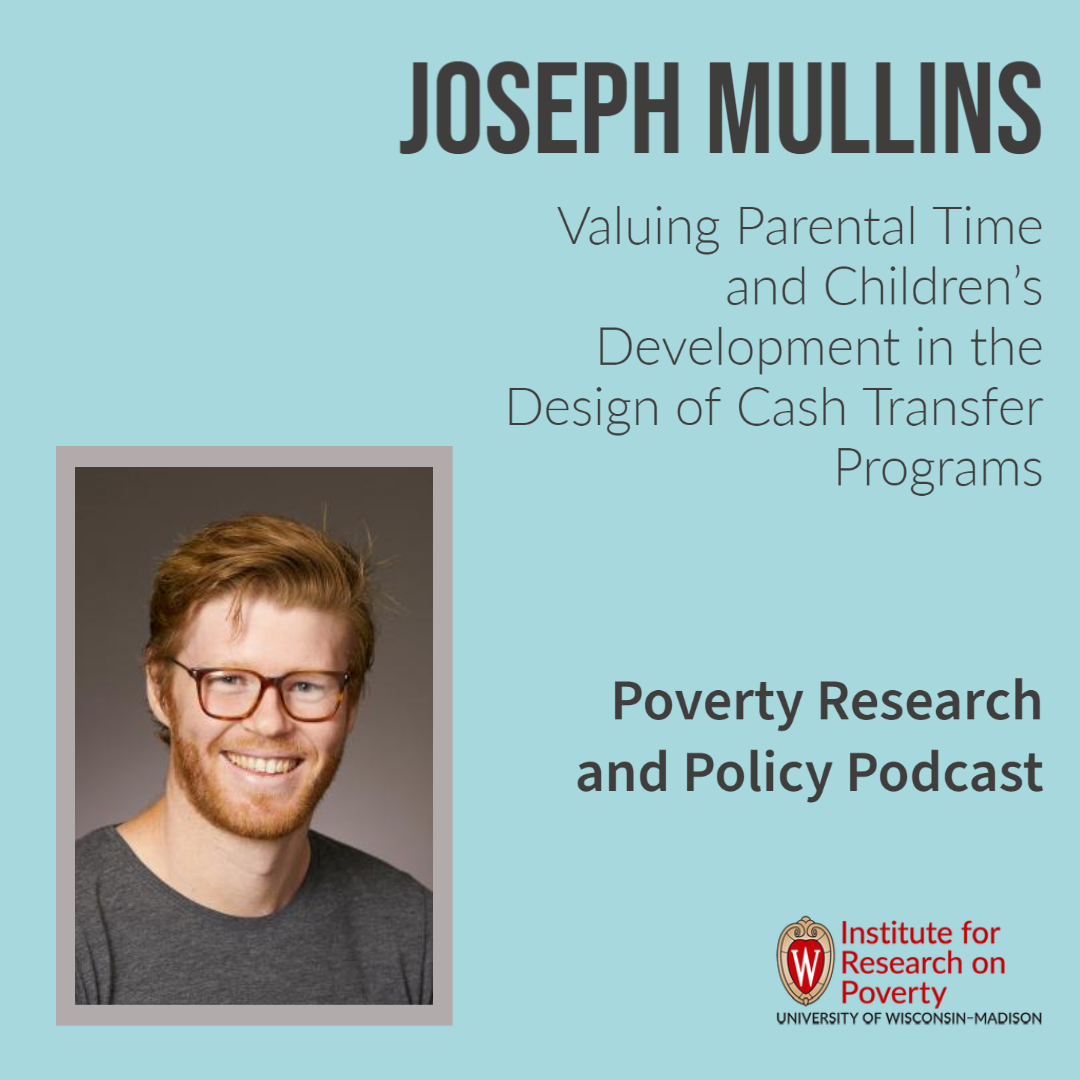

When it comes to cash transfer programs like welfare for single parents and especially mothers, most of the evaluation and economic modeling efforts have focused on how those programs impact the amount of paid work single parents do. However, there's been less attention to the value of parental time and how that matters for children's development. For this podcast episode, we hear from economist Joseph Mullins of the University of Minnesota, who developed an economic model for U.S. cash transfer programs that attempts to place an accurate value on parents' time when assessing cash transfers programs. He says his model suggests a very different structure for our cash transfer programs if we want to best balance children's need for money resources and parental time for their healthy development. Link to the paper: http://www.josephlyonmullins.com/DesigningCashTransfers_Children_Draft.pdf


The Biden administration's plan to alleviate federal student loan debt has the potential to reduce the debt of approximately 43 million Americans, and almost half of those borrowers will have their debt forgiven completely. The move has prompted praise from some, and strong criticism from others. In this episode, we’re joined by Professor Nick Hillman, who studies educational inequality, college affordability, and student loan debt and default. Hillman is a professor in the Department of Educational Leadership and Policy Analysis at the University of Wisconsin-Madison. He also directs the Student Success through Applied Research Lab, which is a research-practice partnership with the university's Division of Enrollment Management and Office of Student Financial Aid. Hillman is also a faculty affiliate at IRP and at the La Follette School of Public Affairs.


IRP recently hosted Dr. Noni Gaylord-Harden, Dr. Jocelyn Smith Lee, and Dr. Alvin Thomas for a webinar conversation on Youth Trauma and Resilience in Contexts of Poverty. They discussed how a growing body of research has begun to change understandings of how toxic environments can affect young people, particularly African American boys and young men and how research, policy, and practice can incorporate these lessons. More information about the webinar can be found at https://www.irp.wisc.edu/resource/youth-trauma-and-resilience-in-contexts-of-poverty/.


For this episode, we hear from Dr. Casey Stockstill about research she did to better understand economic and racial segregation in preschools. Dr. Stockstill spent time observing in two highly rated preschools in the same city: One was a Head Start location where nearly all of the children were students of color and from lower income families and the other was a private preschool in a more affluent part of town where nearly all the students were white and from higher income families. Her observations offer insights about how inequality and segregation in early childhood education can play out in the classroom for students and their teachers.


2022 marks the 25th anniversary of the publication of by Kathryn Edin and Laura Lein. The book was based on interviews with low-income single moms that took place between the late 1980s and early 1990s. Edin and Lein detailed the women's household budgets, the strategies they used to support their families, and the unforgiving choice between welfare and low-wage work. In this episode, we hear from Kathryn Edin about what she learned from talking to these mothers and about the changes in U.S. antipoverty policy in the 25 years since was published. A transcript for the episode is available at https://www.irp.wisc.edu/resource/kathryn-edin-on-the-25th-anniversary-of-making-ends-meet/.


Where we get information about money and how to manage it can have long-lasting impacts on financial security and wealth accumulation. While there are some commonly shared sources of information that shape our attitudes and beliefs, there are also some significant differences across racial and ethnic groups. In this episode, Dr. Zawadi Rucks-Ahidiana joins us to discuss her recent paper titled, “Race and the Financial Toolkit: Bridging Cultural Theories to Understand Behavior and Decision Making in the Racial Wealth Gap.” Rucks-Ahidiana is an Assistant Professor of Sociology at University at Albany, State University of New York. Her research investigates how race informs gentrification, how the news media represents gentrification, and how culture contributes to the racial wealth gap. She is also a former IRP Emerging Poverty Scholar.


In this episode of the Poverty Research & Policy Podcast, we hear from Brieanna Watters and Robert Stewartabout a paper they coauthored* on Native Americans and Monetary Sanctions involving the criminal legal system. They discuss how Native American experiences in relation to the legal system are often unique, how the rural nature of Indian Country matters when it comes to policies around fines and fees, and how their research in Minnesota finds higher levels of fines and fees for Native American defendants, particularly in areas near reservations. Watters is a Ph.D. candidate in sociology at the University of Minnesota, and Stewart is an assistant professor in the Department of Criminology and Criminal Justice at the University of Maryland. *The paper discussed in the episode was coauthored by Stewart, Watters, Veronica Horowitz, Ryan Larson, Brian Sargent, and Christopher Uggen. You can find it in a special issue of RSF: The Russell Sage Foundation Journal of the Social Sciences at https://www.rsfjournal.org/content/8/2/137


In this episode, we hear from José Pacas about data challenges involved in measuring rural poverty in the Supplemental Poverty Measure or SPM and how the subtleties of poverty measurement can have real world implications for the lived experiences of low-income people in rural places. Dr. Pacas is currently serving on a National Academy of Sciences, Engineering, and Medicine panel on Evaluation and Improvements to the Supplemental Poverty Measure. He is Chief of Data Science and Research at Kids First Chicago and was previously a researcher at IPUMS at the University of Minnesota. Dr. Pacas was a 2019-2020 fellow in the IRP Scholars in Residence Program.
